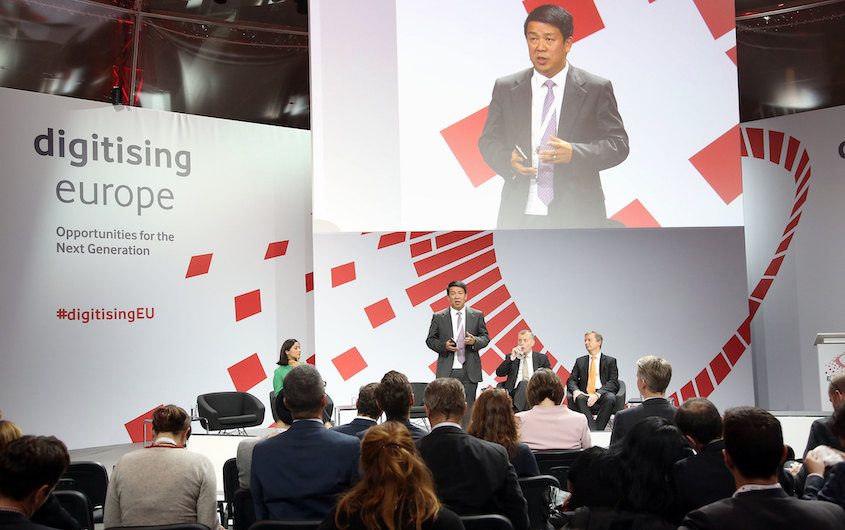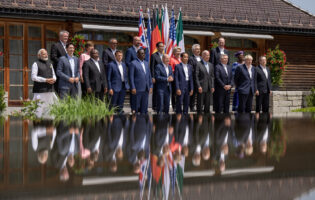
Kevin Tao, President of Huawei, Western Europe via Vodafone Institute
China as Digital Superpower: An American-German Workshop on Digital Infrastructure and Digital Security
Today’s China has grown into a digital superpower alongside the United States with its central role in global digital technology manufacturing, innovation, and increasing market share. This has created a major new front in geostrategic competition. While internet protocols, hardware design and manufacturing, software development and deployment, and services and standards have been on a trajectory toward ever closer integration in the past two decades, intensifying Sino-U.S. rivalry has pushed both governments to disentangle their technology interdependence. A torrent of recent U.S. legislation and the Trump administration’s policies employ measures intended to restrict China’s access to U.S. technologies, reduce U.S. exposure to Chinese digital services, scrutinize corporate financing, and limit talent exchange.
Washington launched a global campaign to curb adoption of Chinese-built or -maintained digital infrastructure including 5G base stations, cloud data centers, and undersea cables. In response, the Chinese government has enacted retaliatory measures, doubled down on state subsidies to accelerate the development of domestic alternatives, and hardened its long-standing practice of domestic censorship as well as state-sponsored surveillance. Beijing also stepped up efforts to lead global standard-setting for critical and emerging technologies.
These policy choices by Washington and Beijing are often justified by a broad definition of national security that has serious implications for the open digital architecture that has fueled tech-sector growth and the increasingly important cross-border trade of digital technologies and data. Some of these policies also have wide-ranging exterritorial implications and many countries are concerned they would be pressured to choose sides in an ensuing digital Cold War between the world’s two digital superpowers.
In Germany and the EU, there is a growing realization that their own digital competitiveness and China’s digital ascendancy have long been overlooked. Yet Europeans are not content to be pressured or courted by Washington and Beijing. The EU’s newfound aspiration for digital autonomy aims to change a culture of complacency on digital technologies, as the bloc has embarked on a course to pursue regulatory leadership. The EU increasingly sees digital technologies not just through the lenses of economic benefits and privacy, but also national security and geopolitical consequences. It is scrutinizing both U.S. tech giants and Chinese investments.
However, the EU’s drive toward digital autonomy faces challenges because of its dependence on both the U.S. and China, which together dominate global digital technology supply chains and ecosystems. The continuing Sino-U.S. rivalry also makes European policy choices on digital infrastructure and digital security a diplomatic balancing act. The German government’s procrastination over its 5G infrastructure policy perfectly illustrates this predicament. Some European politicians and industry experts are already advocating going beyond defensive postures (protecting privacy and deterring cyberattacks and cyber espionage and bolstering its manufacturing and regulatory capacity) to advance its economic and strategic interests in the face of faltering global technology supply chains, fragmenting technology ecosystems, and intensifying technology competition.
This workshop surveys top priorities and concerns in Berlin and Washington regarding digital challenges from China and how they are being translated into policy initiatives to rethink digital infrastructure and strengthen digital security on both sides of the Atlantic. With the insights and expertise of our participants, we addresses how the United States and Germany (as well as the EU) can best manage these challenges while facing a China that increasingly aspires to leadership in global digital innovation and transforming digital governance to suit Beijing’s values and interests.
Speakers
Stephen C. Anderson is the Acting Deputy Assistant Secretary for International Communications and Information Policy in the Bureau of Economic and Business Affairs. In this capacity, he leads development of international Internet, data, and privacy policies and related negotiations with foreign governments.
Previously, Mr. Anderson was Director of the Office of Specialized and Technical Agencies in the State Department’s Bureau for International Organization Affairs. In that role, he was responsible for U.S. relations with over 40 specialized UN agencies, funds and programs, and was the lead U.S. negotiator of the successful U.S. effort to reform the Universal Postal Union’s remuneration system for the ecommerce era.
In 2017, Mr. Anderson was the State Department Visiting Fellow at the Chicago Council on Global Affairs. From 2014 to 2017, he served as Deputy Chief of Mission and Chargé d’affaires at the U.S. Embassy in Antananarivo, Madagascar, where he helped restore full diplomatic relations after a 2009 coup. He served multiple tours in Iraq and Afghanistan focused mainly on the management of provincial reconstruction teams.
Mr. Anderson has also been posted to Mexico, Germany, Guatemala, Argentina, and Italy since joining the Foreign Service in 1994. He is the recipient of numerous State Department superior and meritorious honor awards.
Dr. Melissa K. Griffith is a Public Policy Fellow with the Science and Technology Innovation Program (STIP) at the Woodrow Wilson International Center for Scholars; a Non-Resident Research Fellow at the
University of California, Berkeley’s Center for Long-Term Cybersecurity (CLTC); and an Adjunct Assistant Professor at Georgetown’s Center for Security Studies (CSS). She works at the intersection between technology and national security with a specialization in cybersecurity.
Griffith’s current book project investigates how relatively small countries, with limited resources, have become significant providers of national cyber-defense for their populations alongside far larger states such as the U.S. Her work sheds important light on the components and dynamics of cyber power and cyber conflict, as well as the vital role that public-private cooperation and both security and economic policy play in cyber-defense. Concurrent research projects examine (1) the national security implications of 5G, (2) collective defense and resilience in cyberspace, and (3) emerging technologies and great power competition.
Griffith holds a Ph.D. in Political Science from the University of California, Berkeley (2020); an M.A. in Political Science from the University of California, Berkeley (2014); and a B.A. in International Relations from Agnes Scott College (2011).
Dr. Maximilian Mayer is Junior-Professor of International Relations and Global Politics of Technology at University of Bonn. He was assistant professor at the University of Nottingham Ningbo China (2019-2020). He is also research fellow at Renmin University Beijing (2018-2020), worked as Research Professor at Tongji University, Shanghai (2015-2018) and was senior researcher at the Munich Center for Technology in Society, Technical University Munich (2018-2019). Maximilian worked at the Bonn University’s Center for Global Studies (CGS) as managing assistant and senior fellow (2009-2015).
Maximilian holds a master’s degree from Ruhr University Bochum and obtained his PhD at Bonn University. His research interests include the global politics of science, innovation, and technology; China’s foreign and energy policy; global energy and climate politics; theories of International Relations.
Maximilian presents regularly at international conferences, publishes his research in peer-reviewed journals, and has authored seven books including China’s Energy Thirst: Myth or Reality? (2007 together with Xuewu Gu), Changing orders: transdisciplinary analysis of global and local realities (2008, coeditor), two-volumes on The Global Politics of Science and Technology (2014, lead editor). He is coeditor of Art and Sovereignty in Global Politics (Palgrave, 2016) and edited Rethinking the Silk-Road: Chinas Belt and Road Initiative and Emerging Eurasian Relations (Palgrave, 2018). Maximilian was visiting scholar at Harvard Kennedy School, Program on Science, Technology and Society, and section co-chair of STAIR (Science, Technology, Arts and international relations) of the International Studies Association (2015-2017) and STAIR program chair (2014-2015).
This event is generously supported by the Fritz Thyssen Foundation.







